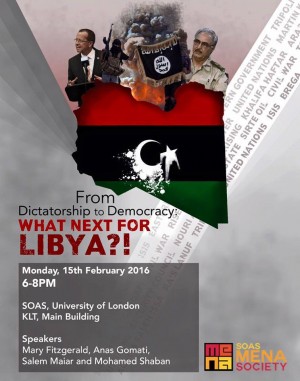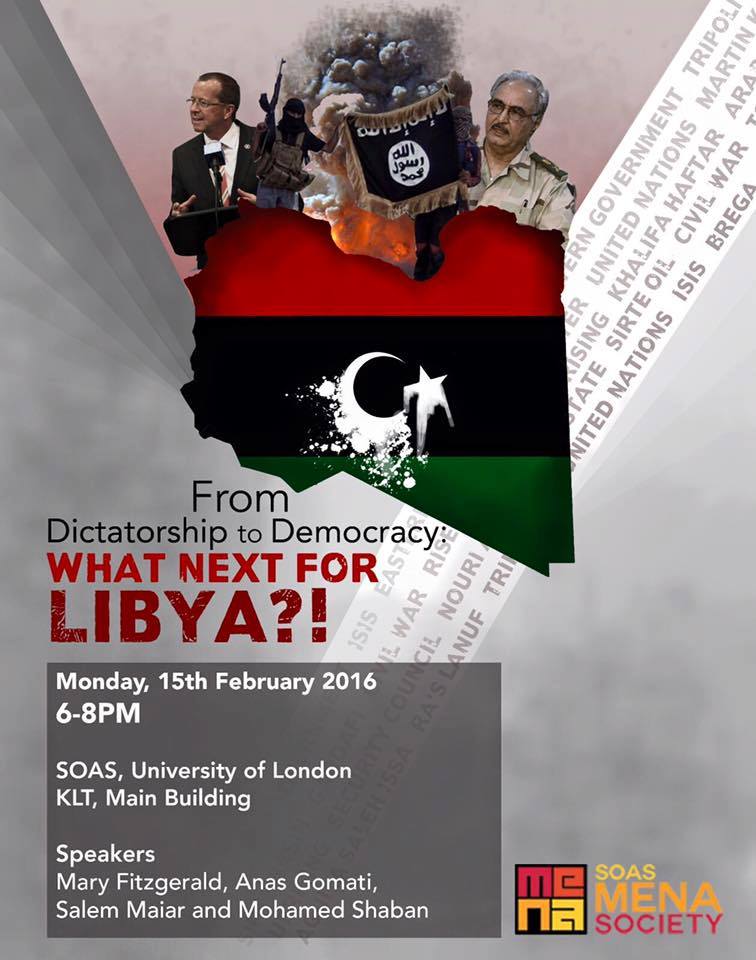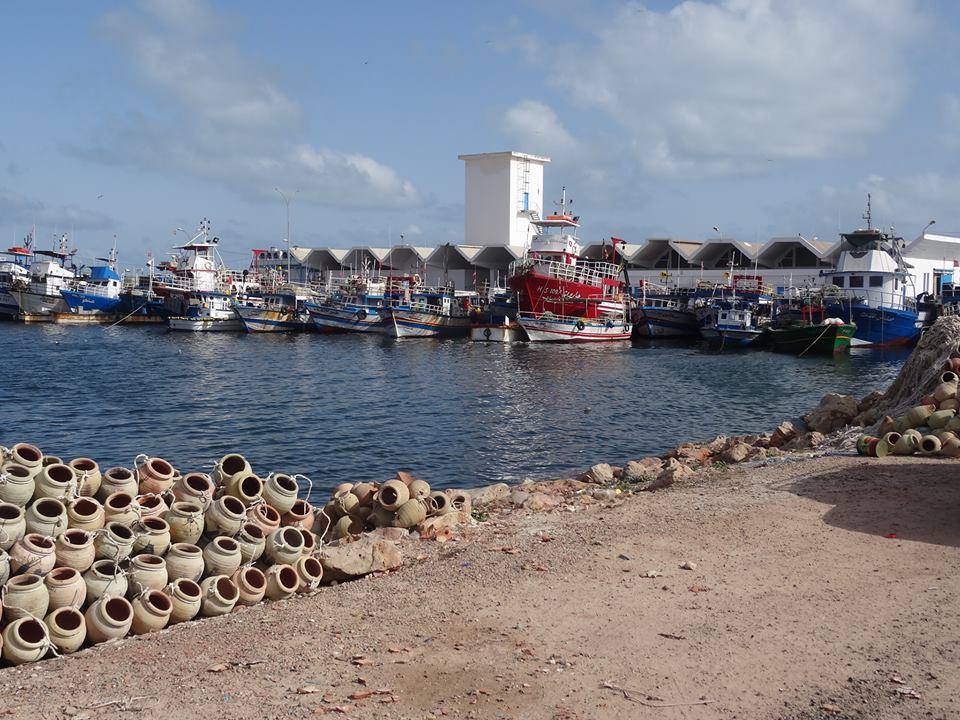By Sami Zaptia.

London, 18 February 2016:
SOAS’s MENA Society hosted a four-person panel discussion on Libya last Monday ‘‘From Dictatorship to Democracy: . . .[restrict]What Next for Libya?’’ to mark the fifth anniversary of the country’s 17th February 2011 revolution.
The panelists were Mary Fitzgerald, journalist, analyst and author; Mohamed Shaban, lawyer; Anas El Gomati, journalist author and analyst and Salem Maiar, freelance consultant.
Anas El Gomati opened proceedings with a comprehensive roundup of the Libyan revolution, its causes, effects and multilayered interactions. He also touched on a number of possible future scenarios and directions that Libya might take with its efforts to form a UN-brokered Government of National Accord.
Gomati felt that the barbaric nature of the killing of Qaddafi was a turning point in Libya’s revolution. ‘’Better to be oppressed than to be the oppressor. (Libya’s) militias have not learnt the difference between the oppressor and the oppressed’’, he proclaimed.
‘’Soon there will be no pie to share” he noted regarding the grab for oil wealth. ”We need leaders who can be consensual and take responsibility’’, he added.
Ultimately, Gomati felt that Libya needed a ‘’natural dialogue going forward without limits. You don’t make peace with your friends, but with your enemies’’, he commented with regards to the need for nationwide reconciliation encompassing all the conflicting Libyan parties. Only through a comprehensive dialogue and settlement can there be hope of a real solution to Libya’s deep problems, he explained.
Commenting on the state of law and order in Libya, lawyer Mohamed Shaban said that despite the bleak impression coming out of Libya, he was optimistic.
He highlighted how Libya’s Supreme Judicial Council has, in his assessment, remained independent citing the case of it overturning the GNC’s election of prime minister designate Maetig, the case of Tripoli’s Mayor being removed from office and in the last few days the challenge to Ali Tarhuni’s leadership of the Constitutional Drafting Assembly (CDA).
The relative transparency of the trails of former members of the Qaddafi regime, the acquittals of some of the accused, the review of death sentences, as well as the fact that none of the death sentences have been carried out – all give Libya hope, Shaban said.
This was in spite of the immense pressures being exerted by various lobbyists to the contrary, he explained.
Shaban said Libya needed its Government of National Accord (GNA) to be approved by its parliament, the Tobruk-based House of Representatives (HoR) and the draft constitution to be agreed as soon as possible and within the next transition period of the GNA.
Shaban felt that the draft meets international standards as long as it has mechanisms for amendment as most constitutions are amended over time.
On the issue of litigation claims by foreign contractors against Libya, Shaban said that on average, there was a new case every two weeks and that the new government would have to deal with these cases.
On Libya’s frozen and lost Libyan state assets, Shaban noted that the frozen assets were under UN sanctions which belonged mostly to the LIA (Libyan Investment Authority). He felt that it was fair that they remained frozen in view of current circumstances.
Other lost assets were outside the control of the Libya state and were unquantifiable and the Libyan state has failed to recover them. Although a few committees were set up to recover these lost assets, they have not made progress. He felt that the best placed to pursue these assets was probably the Central Bank of Libya’s assets recovery unit.
Shaban noted that squandering money is not necessarily a criminal matter since many cases were based on nepotism etc, and this makes it difficult for the Attorney General/Public Prosecutors Office to initiate action.
Speaking on civil society and minorities, Salem Maiar noted that were were very few NGOs during Qaddafi’s time but that after 2011 this had mushroomed to about 2,000. On a per capita basis this compared to Iraq and even Egypt. Some NGO’s were politicized, some were promoting religion and many soon ran out of money and lacked organization disappearing quickly.
Today many activists are in danger and are often targets of coercion or even assassination.
Maiar reviewed Libya’s minorities and their various positions viz-a-viz the 17th February revolution and their current positions on the various contentious political and constitutional issues stressing that they should all be given full rights and encompassed within Libyan society as full members.
Mary Fitzgerald highlight the various sign posts in Libya since 2011 noting the mixed emotions being expressed by Libyans on the occasion of the fifth anniversary of the 17th February 2011. She noted the problem of exclusion politics and polarization which she feared may cause the Libyan Political Agreement (LPA) to collapse.
She noted how ordinary Libyans were fed up and struggling with everyday difficulties as the economy continued in freefall. They desperately want an end to the conflict she noted. Fitzgerald also highlighted the state of denial that some Libyan officials are still in – be it on the state of the economy or IS/Daesh.
Fitzgerald felt that the poison of polarization has seeped into Libyan society, including the national reconciliation dialogue. The lack of consensus and zero sum game politics were a stumbling block going forward. Libyans need to learn how to build a consensus culture and how to create a national identity, she added.
Mary Fitzgerald (@MaryFitzger), a journalist and analyst specialising in the Euro-Mediterranean region with a particular focus on Libya. She has reported from Libya since February 2011 for media including the Economist, the BBC, Foreign Policy, the New Yorker, the Financial Times and the Guardian. She lived in Libya throughout 2014. She is a contributing author to “The Libyan Revolution and Its Aftermath” published by Hurst/Oxford University Press.
Mohamed Shaban (@MShaban_MSlegal): Shaban is the Principal Partner at MS-Legal Solicitors and First Libyan ever to qualify as a solicitor of the Supreme Court of England and Wales and is the only Libyan to exclusively own a law firm in this jurisdiction
He has represented the State of Libya in the following cases: (all are in the public domain). State of Libya v Capitana Seas Ltd (first ever asset recovery case following the Arab spring). M. Janah v the State of Libya (being heard before the Supreme Court and is likely to be a precedent in issues of employment rights v Sovereign immunity). Way2B v the State of Libya and ODAC (major investment dispute between Libya and Portugese company being heard by the International Chamber of Commerce) He has also advised Libya as an interested party in the repatriation of valuable Greek artefacts in the case of HMRC v Riad Al Qawas and also advised Libya in the repatriation of valuable Roman artefacts. A case did not reach the court system as Christies auctioneers settled the case.
Anas El Gomati (@AGomati) is the founder and current Director General of the Tripoli-based Sadeq Institute, the first public policy think tank in Libya’s history established in August 2011. Anas is also the research director for the security & governance programme at the institute. He is a visiting lecturer at the NATO Defense College in Rome, where his work focuses on the emerging political, ideological and security trends in Libya and former scholar at the Carnegie Middle East Centre in Beirut. In addition, he has served as an adviser and publisher on Libyan affairs for several European Union institutions and think tanks. He is a frequent commentator on Libya & the MENA region on Al Jazeera, BBC, France 24, Sky News. His research focuses on the security sector, political affairs, Islamism and Salafi Jihadism. He is most recently the author of ‘Libya’s Islamists and Salafi Jihadists – the battle for a theological revolution’ of the edited volume ‘The Arab Spring Handbook’ (Routeledge Press 2014)
Salem Maiar (@SalemMaiar) after attainment of his MBA, Salem joined Brown & Root, Halliburton & subsequently KBR where he held various positions culminating in assisting the director of the consulting group. Salem’s focus is natural resources management specifically water security in Libya. He also holds an MPhil from the School of Oriental & African Studies. He was the National Advisor in charge of the GNC, CDA & CoR elections for the Libyan community in the UK. He is a council member of the Society for Libyan Studies & a postgraduate fellow of the Royal Geographical Society. Salem, pro bono, advised the CDA on water aspects, disability issues & the sustainability of Libya. He is currently a freelance consultant. [/restrict]










